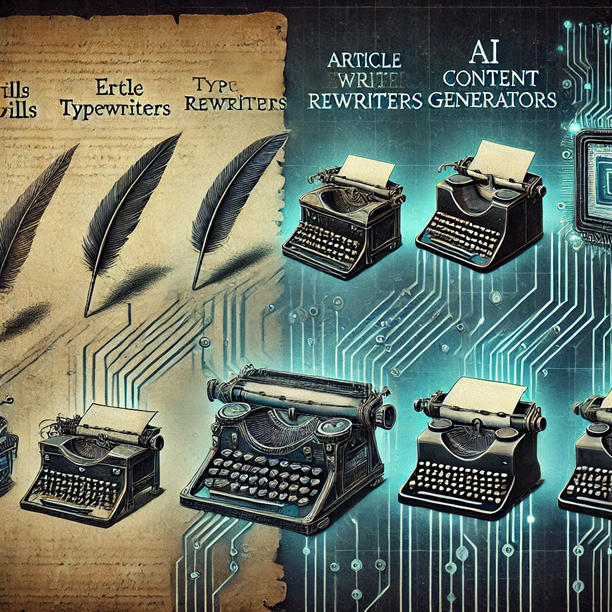The Evolution of Writing Tools: From Article Rewriters to AI Content Generators in the Digital Age

The journey of writing tools mirrors the evolution of communication itself—from quill and ink to typewriters, word processors, and beyond. But perhaps no era has seen a more dramatic transformation than the digital age, where writing tools have become not only more sophisticated but also more integrated with artificial intelligence. This shift has fundamentally changed how we create content, making the process faster, more efficient, and in many ways, more creative.
A Glimpse into the Past: Early Digital Writing Tools
In the early days of the internet, writing tools were relatively simple. Word processors like Microsoft Word were revolutionary, offering features like spell check, word count, and basic formatting. These tools made the writing process more streamlined, but the core of content creation still relied heavily on the writer's skills and creativity.
As content began to dominate the web, the need for faster and more efficient writing tools grew. Article rewriters and spinners emerged, offering a way to quickly rephrase existing content. These tools were often rudimentary, relying on synonym substitution and basic algorithms to generate "new" content from existing texts. While they saved time, the results were often clunky, lacking the natural flow and coherence of human writing.
The Rise of AI-Powered Writing Tools
As technology advanced, so did the capabilities of writing tools. The introduction of artificial intelligence into content creation marked a significant leap forward. Early AI-powered tools still focused on rewriting and spinning articles, but they began to incorporate more sophisticated algorithms that could understand context and syntax better than their predecessors.
These AI tools offered a glimpse into the future of writing—a future where machines could assist in generating content that was not only coherent but also engaging and relevant. The rise of machine learning allowed these tools to "learn" from vast datasets, improving their output over time.
The Modern Era AI Content Generators
Today, AI content generators like GPT (Generative Pre-trained Transformer) have taken the evolution of writing tools to a whole new level. These advanced systems can generate entire articles, social media posts, product descriptions, and even creative writing pieces with little to no human input. The AI understands context, tone, and even the nuances of human language, producing content that is nearly indistinguishable from what a human might write.
What sets modern AI content generators apart is their ability to not only rewrite but also create. They can analyze trends, understand audience preferences, and generate content that resonates with readers. This has made them invaluable tools for digital marketers, content creators, and businesses looking to scale their content production.
The Impact on Writers and Content Creation
The evolution of writing tools has had a profound impact on the way content is created and consumed. For writers, these tools have become both a challenge and an opportunity. On one hand, AI content generators can produce vast amounts of content quickly, which can be daunting for writers who fear being replaced by machines. On the other hand, these tools can serve as powerful assistants, helping writers brainstorm ideas, structure their work, and even overcome writer's block.
For businesses, AI content generators offer a way to scale content production without sacrificing quality. They can generate content tailored to specific audiences, optimize it for SEO, and even personalize it for individual users. This has revolutionized digital marketing, making it possible to reach wider audiences with targeted, relevant content.
The Future of Writing Tools
As AI continues to advance, the future of writing tools looks both exciting and complex. We can expect AI to become even more integrated into the content creation process, offering tools that not only generate content but also edit, optimize, and distribute it. These tools will likely become more intuitive, understanding not just language but also the subtleties of human emotion and creativity.
However, it's important to remember that while AI writing tools are powerful, they are not a replacement for human creativity. The best content will always come from the unique perspectives, experiences, and insights that only humans can provide. AI can assist, enhance, and even inspire, but the heart of storytelling remains firmly in human hands.
Conclusion
The evolution of writing tools from article rewriters to AI content generators marks a significant chapter in the history of communication. These tools have transformed how we create content, making it faster, more efficient, and more accessible. As we move forward, the collaboration between human creativity and AI technology will continue to shape the future of writing, offering endless possibilities for content creation in the digital age.
